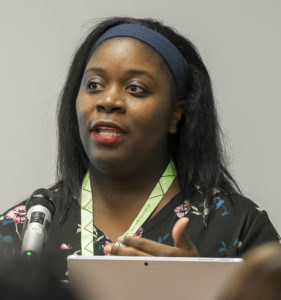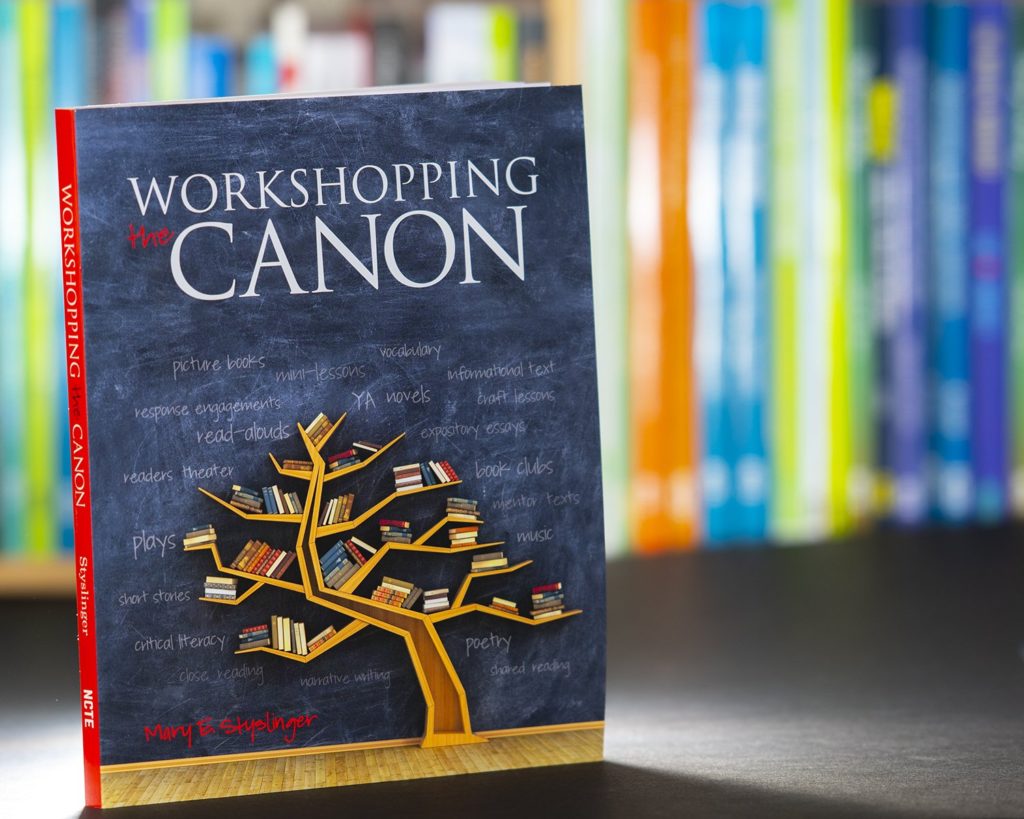This post was written by NCTE member Vikki Orepitan.
The third week of NCTE Reads focused on Chapters 5 and 6 of Mary Styslinger’s Workshopping the Canon. Chapter 5, “Ways to Talk,” addressed student-led discussions especially in book clubs and Socratic seminars. Chapter 6 is about “Mini-Lessons.”
Last week, I discovered that although I’ve been reading since age four (mom-verified), I am NOT a storyteller. This week better suited my skill set: Love to read? Check. Talkative? Check. This is a chapter I can get behind!
Styslinger asserts that students want to talk about what they’ve read, and in my experience that’s true! I hear them talking about the books they’ve read and the shows they’ve watched—in the hallways, during lunches, and in class before the bell rings.
However, when I sit them in that big circle, with their novels open, papers out, and pens in hand, I am met with SILENCE. If you don’t understand the oxymoron “deafening silence,” stop by a freshman English classroom on discussion day.
Styslinger suggests a remedy for this—preparation. In both chapters this week, Styslinger reminds us all (and especially secondary teachers) that we can’t assume that students know how to do the things we want to incorporate into our classrooms. “In our eagerness to implement book clubs, we forget to teach students how to make a thoughtful book selection, how to organize a reading calendar, how to respond to reading in a blog, how to talk about books with classmates, or how to go about a book club meeting” (88).
In the case of book clubs and Socratic circles, Styslinger means observation, note-taking, and rule-setting before the discussions ever begin. In WTC, Styslinger suggests a clip from the Looking into Literature Circles DVD. For free alternatives, consider one of these:
- For book clubs
- For Socratic circles (Thanks to Shervette for the recommendation!)
Also, AJ recommended AVID as a Socratic seminar resource. After briefly searching “AVID Socratic seminar,” I found several really detailed resources, including guides for teachers and students!
Another great idea from WTC is digital book clubs. If your campus uses Canvas or Blackboard, you have a built-in tool for this. Years ago, I used digital book clubs with Edmodo.com. There are so many viable options. And it helps me with that whole “it’s only 45 minutes—HOW?” feeling.
While Styslinger recommends book clubs for the YA selections and Socratic circles for the canonical text, I really think these layered forms of discussion could be used even in classrooms where YA lit or canonical works are less prevalent. I think good practice is good practice, no matter what you’re reading.
In a serendipitous course of events, I attended an in-district PreAP training that was definitely intended for middle school teachers. (The presenters began by welcoming all the “awesome middle school teachers,” LOL.) BUT, I stayed, and what I learned was how much more effort goes into the process of instructions for middle schoolers.
One good takeaway for me was to “give clear instructions and practice everything.”
The presenters both teach AP Literature (Grade 12), but they said that before they ever have a whole class discussion, they prepare by asking their students to sit in a circle and, one person at a time, say the alphabet. The students can’t go in seat order, and if anyone interrupts another student, then they start over. This gives students a low-stakes opportunity to practice listening to each other and speaking in turns. With 12th graders! Who knew?! The TALK prompt reinforced this idea. Twenty-two—that’s right, TWENTY-TWO teachers offered their best practices regarding small and large group discussions and book clubs!
I really enjoy when the multiple facets of my life start telling me the same thing—I think of it as a big, “Listen up, Vikki, it’s the universe!” moment.
This week, the MAKE task was my mountain.
Rereading it, I don’t know what I was struggling with, but I was at a loss. I don’t think the concept of the mini-lesson was an issue. It’s pretty straightforward: you model, then practice together, then provide opportunities for independent practice and independent completion.
What I found difficult was creating an example that met WTC’s parameters for a mini-lesson. My existing mini-lessons are mostly analytical and grammatical, and even though I consider myself a pretty quick lesson writer, coming up with something new that really met the book’s specifications took longer than the week we were meant to spend on the unit.
After reading more closely, I realized that aside from being one of those teachers whom Styslinger says “have always talked too much” (p. 66), I was on the right track.
So really, if your students are learning and participating and talking about the lessons you’re teaching, you’re doing a lot of things right, so don’t be so hard on yourself!

Vikki Orepitan is a 9th grade Pre-AP English teacher at Cinco Ranch High School in Katy, TX. This year she was awarded the Mercedes Bonner Leadership Award by TCTELA (Texas Chapter of NCTE) as well as the NCTE Intellectual Freedom Award for publicly opposing her district’s ban of Angie Thomas’s novel, The Hate U Give. She has taught multiple levels of English as well as Ethics (Civics) to students in Abu Dhabi and in Texas in grades ranging from 7 to 12. Inspired by her childhood teachers, her college instructors, and her mentors, she wishes to empower educators (and students) to challenge injustice and model leadership in their communities.

